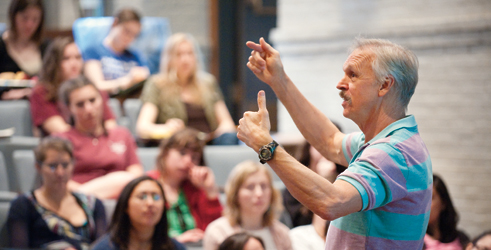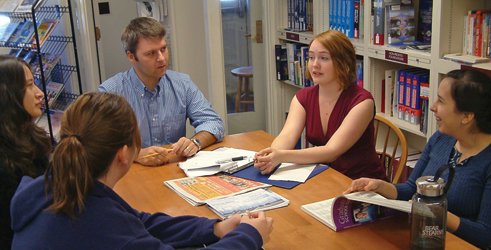Resilience and Innovation: Smith Responds to Economic Realities

"Take control of your finances." Before they graduate, Smith seniors annually flock to a popular financial workshop taught by economics professor Randall Bartlett. He walks the young women through timeless financial principles and offers guidance about how to manage everything from credit card debt to retirement funds. Photo by Jim Gipe.
Even in the midst of shortfalls, there are riches.
It was a Saturday morning in April on the Smith College campus. In the thin, dappled light of early morning, quiet, deserted paths wound across campus, from Seelye Hall to the Campus Center. But there the tranquility stopped.
The center's doors swung open to a noisy communion of passionately enthusiastic students eager to talk about what excites them intellectually—their research, their theses and their performances. This is the annual showcase Celebrating Collaborations: Students and Faculty Working Together, a true celebration of the liberal arts, a linking of innovation and resourcefulness, and of the development of critical thinking, writing and analytical skills. And it was one of many examples of the rich academic experience that unfolds throughout the year at Smith.
But while academic riches remain abundant at Smith, news of a struggling economy has entered the discussion of campus life.
It's been nine months since Lehman Brothers filed for bankruptcy protection and set off a full–throttle financial panic throughout Wall Street and the world of business. The ensuing economic downturn cut into the endowments and pinched the operating budgets of many colleges and universities. And as with most colleges, Smith College was not immune to the nation's financial crisis.
With the tumultuous economy, fundraising dipped and operating costs rose, and the college's endowment contracted sharply. But as Smith President Carol Christ says, the college remains strong and true to its academic mission to educate women of promise for lives of distinction. This time of financial stress presents an opportunity to advance that vision in a new context.
"For all of higher education today, but particularly for small residential colleges, the financial crisis has brought into focus the opportunity to think big and the necessity of considering bold choices and innovative change while continuing to deliver a superb education," she said recently.
Citing the need to trim $20 to $30 million from its budget over the next two years, Smith has taken major steps to save money. It has put a freeze on faculty and staff salaries, eliminated some positions, reduced some of its facilities space and launched plans for further administrative and academic resource sharing among the members of the Five College Consortium, which includes Amherst, Hampshire, Mount Holyoke and Smith colleges as well as the University of Massachusetts Amherst.
Meanwhile, there was good news this spring with another set of numbers that have nothing to do with Wall Street. Smith received the largest number of applications in its history this year. A record 4,011 young women applied for a spot in the Smith Class of 2013, an increase of 6 percent over last year.
Applications from international students grew as well, by 8 percent, with the largest number of applicants coming from China with a total of 317 Chinese nationals. From the international pool, Smith is enrolling 90 women, a record number of first–year international students who will arrive on campus this coming fall.
Acceptance letters went out to 1,894 applicants in late March. Of those, some 673 young women will compose the next incoming class.
"It's hard to say what effect the economy had on this year's pool of applicants," says Karen Kristof, senior associate director of admission. "What we can and do say to prospective students is that even in these challenging times Smith remains committed to meeting the financial need of every admitted student."
Smith's need–based financial aid program relies on a consistent, yet personalized, assessment of each applicant's ability to pay for college expenses. The college meets the full demonstrated need of students, as determined by financial aid policies, says Dean of Enrollment Audrey Smith.
Underscoring the college's deep commitment to a socioeconomically diverse student body, Smith says, "We take a holistic and individual approach in reviewing applications for admission. We look at every applicant in the context of the opportunities she's had available to her and what she has made of them."
"We're looking for women of talent, intelligence and promise, and we're confident of our ability to find them," she says.
One of those young women is incoming first–year student Caroline Quinn of Kansas City, Missouri. When she received her acceptance letter and financial aid award from Smith, she quickly sat down and sent a letter of thanks to Smith's Student Financial Services.
"I feel like a mere 'thank you' could never reflect my immense gratitude," she wrote. "For three years it has been my hope to go to Smith. I have fallen in love not only with the historic and charming campus, but also the intellectually superior academics and exceptional professors at your college. I am so appreciative to have the opportunity to experience these unique features next fall."
As to the financial aid she will receive, she wrote, "I had heard how generous the financial aid is at Smith, so I had hope. My family has always struggled financially, and I have been worried that I would walk out of Smith $100,000 in debt or, worse, not be able to attend at all. Because of your commitment to diversity, I can attend my dream school."
Recession or not, the college recognizes the paramount need for financial literacy among women.
Registration in economics classes remains strong, while faculty across the disciplines are discussing the current economic climate in the classroom.
Outside the classroom, Smith's Women and Financial Independence program provides students with the practical skills and knowledge they need to address financial issues in their personal and professional lives. Some of its educational programs include weekly noncredit courses taught by Smith economics department faculty as well as lectures by industry professionals on such topics as entrepreneurship, socially responsible investing, philanthropy and identity theft.
"Everyone needs to know how to manage her financial life," stresses Mahnaz Mahdavi, economics professor and director of the Women and Financial Independence Program.
Indeed, Smith students from all disciplines were eager partakers in the program's offerings throughout the spring semester. More than 75 participants filled Neilson Browsing Room on Thursdays for economics professor Jim Miller's lectures on "Interpreting Financial News," and soon–to–be–graduates filled to capacity the seats in Stoddard Auditorium in May for economics professor Randy Bartlett's popular Backpack to Briefcase financial workshop for seniors.
Despite the current economic crisis, Bartlett did not make any changes to the financial principles he covers every year. He also discusses such issues as managing credit cards and student loans as well as figuring out job benefits.
"What the course is about is how to deal with finances in a long–term way, for a lifetime," says Bartlett. "Among the things I want students to walk away with are these thoughts: take control of your finances and don't get trapped in debt you can't handle, take advantage of being young and start saving now so you will have the resources to ride out crises like this in the future. These principles are timeless and are still the same as they were last year."
Likewise, in the classroom, Bartlett examines economic foundations, which are not time specific, while explaining the origins of the current crisis situation, which is quite timely. More important, "I think it is my role to look at the crisis rationally rather than emotionally. As far as students know, this is the only financial crisis they have experienced in their lifetime. It is my job to give them the long view and help them understand that there is always going to be a recovery."
Bartlett points out that the current financial downturn is one of several that the country has struggled through in the past 100 years, including the 1987 stock market crash and the Great Depression of the 1930s. Historically, he says, the market always adjusts itself. "This is a subject that I know, and I know the market will come back."
"If you listen to the 'crazies' on the cable news shows, the ones who make a living being dramatic rather than analytical, you might think otherwise," he says with a smile.
"My job is to give students the tools they'll need to cut through all the layers of hype, drama and overreaction."
The mission of Smith's Career Development Office is similar: to help students navigate the often–confusing terrain of the world of work and, this year, supporting seniors seeking employment in one of the worst job markets in a decade. Starting the job search well before senior year remains a vital strategy.
Sophinna Singh '10, an economics major with a minor in philosophy, interviewed for an internship this spring with Deutsche Bank, a global financial services firm. She hoped an internship might lead to a job offer in 2010, as she assumes she will go into finance as a career, working with nonprofits in urban communities. Like her peers she was a bit uneasy this spring. But turning to the CDO ("I spent my entire spring break in the CDO offices working on a cover letter," she jokes) boosted her confidence and polished her skills as she prepared for a phone interview with a top manager at the firm.
For many Smith seniors, the job search process has been fraught with uncertainty. Stacie Hagenbaugh, CDO director, has encouraged students this year to be flexible. While job opportunities are available, she says, graduates may have to give the search more time than students have in previous years.
"Students should not be of the mindset that there aren't any jobs out there," Hagenbaugh says. "Many, many opportunities are there for the savvy and diligent job seeker. But 'diligence' is the key word. Fortunately, Smithies aren't afraid of persistence."
She adds that Smith's alumnae network, with its ability to connect recent graduates to jobs through word–of–mouth referrals, is serving seniors well.
In the meantime, despite a challenging employment market, a host of Smith graduates see a bright future. They have secured jobs at the Kennedy Space Flight Center, Massachusetts General Hospital, the U.S. Navy and Teach for America, to name a few. Others are entering graduate programs at such top–ranking universities as Oxford, Duke and Brown.

In an uncertain job market, Smith's Career Development Office was a good resource for seniors. There are many opportunities for the savvy and diligent job seeker, said CDO Director Stacie Hagenbaugh. Photo by Stacie Hagenbaugh.
Some graduates, like Christa Daly '09, see the economic downturn as an opportunity to broaden their horizons. As one of 21 Smith graduates currently serving as a Peace Corps volunteer, Daly will be teaching English in the Pacific Islands. (Smith ranks third in the country among small colleges and universities in enrolling Peace Corps volunteers.)
Daly majored in government with a concentration in international relations and a Third World development studies minor. "[Smith] has helped me to have a very global worldview," she says.
Allison Doherty '10 had a few words of advice for her peers. "No one said being a grown–up was going to be easy. And if they did, I bet they were lying," she wrote in a guest opinion piece in the Smith College Sophian. "I think Smithies are up to the challenges of a worsening economy and a shrinking job market. You may have to make more calls [to find job opportunities], move home for a while and take a second job. You may have to reconsider the plan of a first child by 30, saving the whales by 35 and curing cancer by 40. These plans may be pushed back awhile–but donít worry, Smithies, you'll get there."
|























